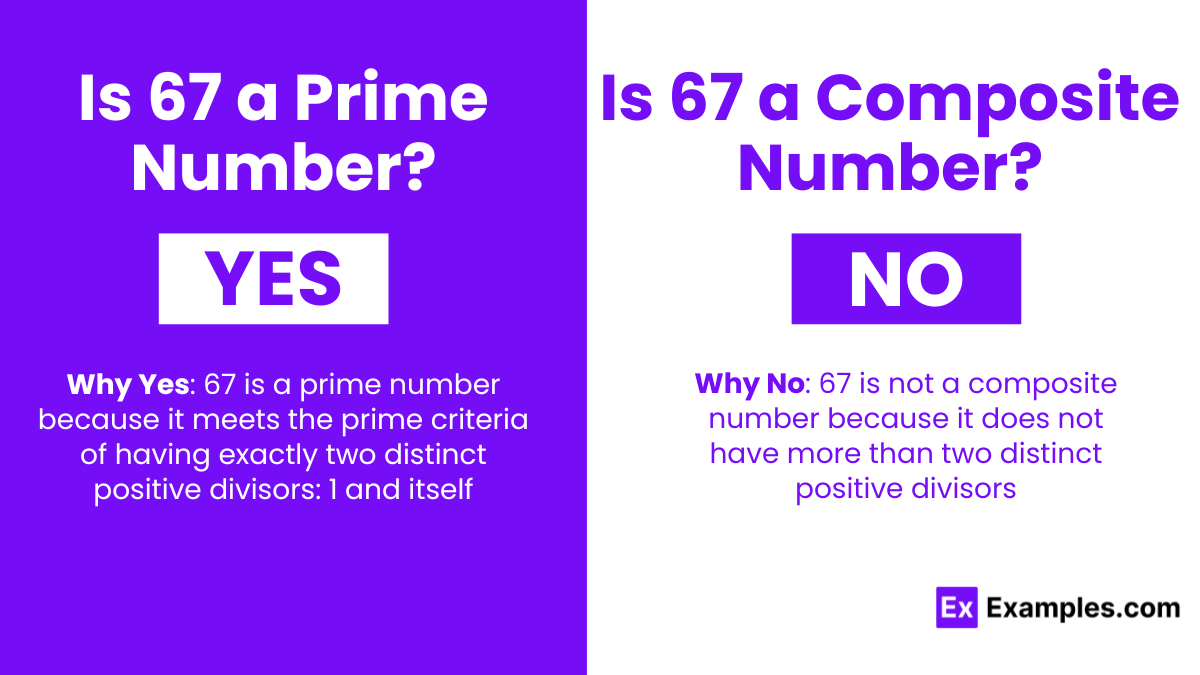Which statement accurately describes the number 67?
67 is a prime number
67 is a composite number
67 is neither prime nor composite
67 is both prime and composite


Why Yes: 67 is a prime number because it meets the prime criteria of having exactly two distinct positive divisors: 1 and itself. Use this Prime number Checker to check for any number.
Why No: 67 is not a composite number because it does not have more than two distinct positive divisors. It is only divisible by 1 and itself (67).
| Property | Answer |
|---|---|
| Is 67 a prime number? | Yes |
| Is 67 a composite number? | No |
| Is 67 a perfect square? | No |
| Factors of 67 | 1, 67 |
| Multiples of 67 | 67, 134, 201, 268, 335, 402, 469, 536, 603, 670 |
| Cube Root of 67 | 4.041 |
| Square of 67 | 4489 |
| Square Root of 67 | 8.185 |
| Is 67 a Perfect Cube? | No |
| Is 67 an Irrational number | No |
| Is 67 a Rational number | Yes |
| Is 67 a Real number | Yes |
| Is 67 an Integer | Yes |
| Is 67 a Natural number | Yes |
| Is 67 a Whole number | Yes |
| Is 67 an Even or odd number | Yes (67 is an odd number) |
| Is 67 an Ordinal number | Yes |
| Is 67 a Complex number | Yes (as all real numbers are also complex numbers) |
The factors of 67 are 1 and 67. 67 is a prime number because it is only divisible by 1 and itself, demonstrating it has exactly two factors. This distinction confirms that it is a prime number, not a composite number.
The nearest prime numbers to 67 are 61 and 71. 61 is the closest prime number less than 67, and 71 is the closest prime number greater than 67
No, 67 is not divisible by any other number except 1 and itself, reinforcing its status as a prime number.
No, 67 is not a perfect square, as its square root is not an integer.
Text prompt
Add Tone
10 Examples of Public speaking
20 Examples of Gas lighting
Which statement accurately describes the number 67?
67 is a prime number
67 is a composite number
67 is neither prime nor composite
67 is both prime and composite
Which of the following numbers is a factor of 67?
1
2
67
34
How many prime factors does 67 have?
1
2
3
4
Which number is not a factor of 67?
1
67
2
3
Which number is the smallest prime factor of 67?
2
3
67
5
What is the largest factor of 67 less than 10?
1
67
5
10
Which statement is correct about the number 67?
67 is divisible by 2
67 is divisible by 3
67 is divisible by 67
67 is divisible by 4
What is the prime status of 67?
Composite
Prime
Neither
Both
Which characteristic indicates that 67 is a prime number?
It has more than two factors
It has exactly two factors
It is an even number
It can be divided by 5
How can you determine if 67 is a prime number?
Check if 67 is divisible by any number other than 1 and itself
Check if 67 is divisible by 2
Check if 67 is divisible by 5
Check if 67 is divisible by 10
Before you leave, take our quick quiz to enhance your learning!

